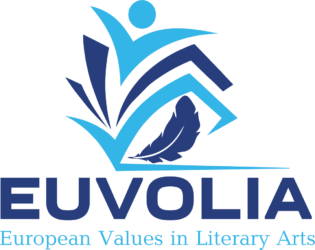
October 16, 2020 Zaporizhzhya National University hosted online Round table debates on Axiological transformations in Ukrainian society under hybrid war held by JMM EUVOLIA project in cooperation with ZNU’s new Jean Monnet initiative, Jean Monnet Module TEMPUS (“Tailoring European Memory Politics for Peacemaking in Ukrainian Society”).
The event was held within the frames of International Erasmus Days and gathered 51 participants, including historians, journalists, HEI and secondary school teachers, students, NGO representatives and members of various professional associations. We were especially delighted to see the coordinators of Jean Monnet Modules EU-Indy, DIRUT and Pan European Convergence for Prevention of Corruption.
The debates were moderated by JMM TEMPUS research coordinator, the Vice-Rector on Academic and Scientific Issues Dr, Yurii Kaganov, the author of a seminal work on Homo Soveticus identity construction in Ukraine; and JMM EUVOLIA co-coordinator, Olena Tupakhina.

The Round Table debates proved to be really intense and thought provoking due to key speakers invited by the moderators. First, the floor was given to Prof. Dr. Fedir Turchenko, who is well-known all over Ukraine as the author of the first school coursebook on modern Ukraine’s history. A devoted researcher and the author of a seminal work on Russian propaganda strategies applied to historical discourse (“Project Novorossia and Modern Russian-Ukrainian War”), Dr. Turchenko started his speech with an interesting comparison. In KGB archives, now open for public access thanks to recent decommunization laws, Ukrainian people are described as “the most patient one”, while in George Orwell’s writings the “silent majority” of the totalitarian state is often called “the well-meaning ones”. What might be the reasons for this well-meaningness even under the conditions of hybrid war? Dr. Turchenko encouraged the round table participants to investigate the problem of people’s inertness in the context of a totalitarian state that denied any attempts at self-reflection and rejected any critical approach to the Communist regime’s crimes. There was no initiative like large-scaled German denazification process applied to former members of the Communist party, Dr. Turchenko highlighted, so the process of replacing old elites with the new ones is still taking place in Ukraine. This is the reason why the values of “parents” would often regenerate in the generation of “children”. At the same time, the well-meaningness can be part of survivalist values. Dr. Turchenko finished his report with a warning to all those teaching values to general public – be it school teachers, public intellectuals or NGO representatives, – not to fall victim to a “formal Europeanness” leaving but an empty form out of the European idea.
Dr. Turchenko’s speech ended on an optimistic note: to his mind, Ukraine has chosen its European way and will never turn back. However, the next speaker, the head of South-Eastern Transregional Department of the National Memory Institute of Ukraine, Dr. Maria Takhtaulova, was much more skeptical. As a coordinator of a public initiative “Kharkiv toponymical group”, she brought plenty of examples of how the memory wars taking place in Ukraine’s East and South over the Soviet heritage and toponymics cast an impact upon the values of the new generation. The researcher specifically highlighted the actions of local authorities cultivating the “local patriotism” by addressing nostalgic memories and axiological constructs built up by systematic totalitarian practices.
In her turn, the author and coordinator of “Lessons of Europe for Ukrainian Schools” initiatives, Svitlana Batsiukova, attracted the participants’ attention to the burning issue of lack of communication and methodological support for the teachers in small towns and villages of conflict-affected territories. By recalling her own experience of five years travelling along the battle line in Donetsk and Luhansk region, the speaker stressed upon the enthusiasm local educators and children demonstrated when attending her EU lessons. Dr. Batsiukova also shared some best practices on how to explain European values to school kids, how to deliver information on cultural diversity etc. It is vitally important for the New Ukrainian School to develop methodology of such lessons and to integrate it into curriculum on Humanities taught at school. According to Dr. Batsiukova’s survey, both teachers and students think that European focus should be clearly present in such subjects as literature and history.

Axiological transformations taking place in Ukrainian civic society were subject of a report delivered by Kateryna Akula, the Head of Community Board of Zaporizhzhya State Council. In her emotional speech, the speaker highlighted the changes taking place in community self-management, shared the success stories of local NGOs and volunteer movements, demonstrated the effectiveness of tools used to secure transparency of democratic processes (Community Board, e-petitions, public budget, school public budget etc.).
